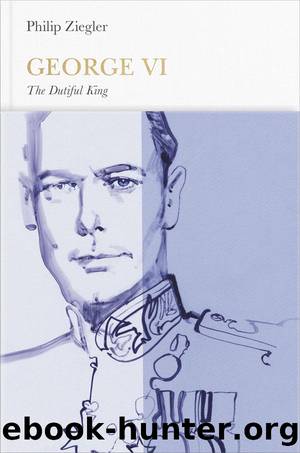George VI (Penguin Monarchs) by Philip Ziegler

Author:Philip Ziegler [Ziegler, Philip]
Language: eng
Format: azw3, epub
ISBN: 9780141977386
Publisher: Penguin Books Ltd
Published: 2014-12-03T16:00:00+00:00
5
The King at War
What was a king supposed to do in wartime in the twentieth century? Clearly George VI was not going to lead his troops into battle, nor was there really any role for him to play in the direction of the war. Neville Chamberlain dutifully kept up the tradition of the weekly audience, but that was the limit, and there were not many other links between No.10 and the Palace. Even in peacetime Chamberlain had been apt to make decisions and take important actions without reference to the king, sometimes leaving him to find out what had happened through the press or wireless; the extra demands on his time caused by the war meant that the king was even more on the sidelines. Through other sources, notably his private secretaries – Hardinge till July 1943 and after that Tommy Lascelles – the king was, however, exceptionally well informed. Scarcely anyone knew as much as he did about the perils which his country was facing and the inadequacy of its means of defending itself. He was one of the handful of people who knew about Ultra, the cracking of the German ciphers through a covert operation based at Bletchley Park – a secret so closely guarded that it was nearly thirty years after the war was over before any official admission was made of what had been achieved. He read the Ultra transcripts, was sent the Cabinet minutes and a mountain of other secret and top-secret material, met and talked freely with many of those most responsible for the conduct of the war. It does not seem, however, that Chamberlain himself made any important contribution to his knowledge.
‘It does not seem’ is an important qualification. What actually takes place at the monarch’s weekly meeting with the prime minister is one of the most jealously guarded secrets in political Britain. Marcia Falkender, Harold Wilson’s most intimate associate, remarked that Wilson had only once divulged to her what had been discussed at the Palace – and that was when the subject had been the style of riding habit the queen was to wear for the ceremony of Trooping the Colour. While Chamberlain was prime minister the silence was total. All the evidence suggests, however, that while the king admired and respected Chamberlain and felt that he was the right man for the job, there was little real warmth between them. The king never found personal communication easy, Chamberlain was by nature cool and withdrawn; the two minds may have met, but the meeting can never have achieved anything approaching intimacy.
George VI had hoped that, once war began, Chamberlain would form a government of national unity, including both Labour and Liberal ministers. Chamberlain was not minded to do anything of the sort; his greatest concession to the wartime spirit was to take back those dissident Conservatives, Churchill and Eden, into the Cabinet. Ironically, in the light of later developments, it was those same two ministers whom the king found it most difficult to like or trust.
Download
George VI (Penguin Monarchs) by Philip Ziegler.epub
This site does not store any files on its server. We only index and link to content provided by other sites. Please contact the content providers to delete copyright contents if any and email us, we'll remove relevant links or contents immediately.
Blood and Oil by Bradley Hope(1253)
Daniel Holmes: A Memoir From Malta's Prison: From a cage, on a rock, in a puddle... by Daniel Holmes(1121)
Ambition and Desire: The Dangerous Life of Josephine Bonaparte by Kate Williams(1090)
Wandering in Strange Lands by Morgan Jerkins(1020)
It Was All a Lie by Stuart Stevens;(944)
What Really Happened: The Death of Hitler by Robert J. Hutchinson(875)
London in the Twentieth Century by Jerry White(850)
Time of the Magicians by Wolfram Eilenberger(846)
Twilight of the Gods by Ian W. Toll(815)
The First Conspiracy by Brad Meltzer & Josh Mensch(814)
The Japanese by Christopher Harding(804)
A Woman by Sibilla Aleramo(800)
Lenin: A Biography by Robert Service(782)
The Devil You Know by Charles M. Blow(782)
Reading for Life by Philip Davis(777)
Cleopatra by Alberto Angela(771)
Twelve Caesars by Mary Beard(771)
1965--The Most Revolutionary Year in Music by Andrew Grant Jackson(717)
The Life of William Faulkner by Carl Rollyson(716)
